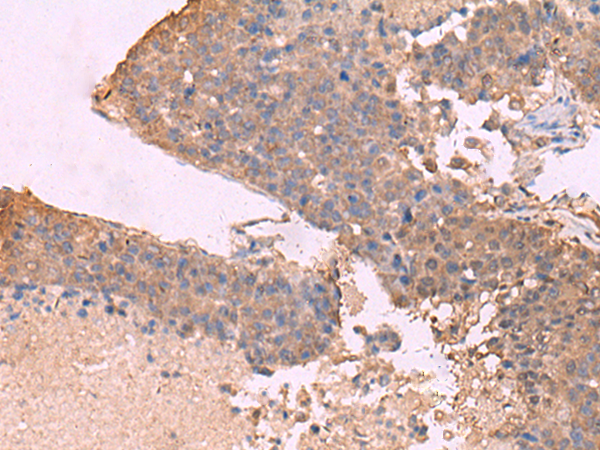
| WB | 咨询技术 | Human,Mouse,Rat |
| IF | 咨询技术 | Human,Mouse,Rat |
| IHC | 1/50-1/300 | Human,Mouse,Rat |
| ICC | 技术咨询 | Human,Mouse,Rat |
| FCM | 咨询技术 | Human,Mouse,Rat |
| Elisa | 1/5000-1/10000 | Human,Mouse,Rat |
| Aliases | KCa5; Slo3; KCNMC1; KCa5.1; Kcnma3 |
| Host/Isotype | Rabbit IgG |
| Antibody Type | Primary antibody |
| Storage | Store at 4°C short term. Aliquot and store at -20°C long term. Avoid freeze/thaw cycles. |
| Species Reactivity | Human |
| Immunogen | Synthetic peptide of human KCNU1 |
| Formulation | Purified antibody in PBS with 0.05% sodium azide and 50% glycerol. |
+ +
以下是关于KCNU1抗体的模拟参考文献示例(非真实文献,仅供格式参考):
1. **文献名称**:*KCNU1 Channel Expression in Neuronal Development*
**作者**:Smith A, et al.
**摘要**:研究利用KCNU1特异性抗体分析其在神经元发育中的表达模式,发现KCNU1在胚胎期海马体中高表达,提示其可能参与神经突触形成。
2. **文献名称**:*Characterization of a Novel Anti-KCNU1 Monoclonal Antibody*
**作者**:Zhang L, et al.
**摘要**:报道了一种新型KCNU1单克隆抗体的开发与验证,通过Western blot和免疫组化证实其特异性,并应用于心脏组织KCNU1蛋白定位研究。
3. **文献名称**:*KCNU1 Dysregulation in Cardiac Arrhythmias*
**作者**:Johnson R, et al.
**摘要**:使用KCNU1抗体检测心脏组织样本,发现KCNU1蛋白表达异常与离子通道功能紊乱相关,可能导致心律失常的发生。
4. **文献名称**:*KCNU1 as a Potential Biomarker in Glioblastoma*
**作者**:Lee S, et al.
**摘要**:通过免疫荧光(KCNU1抗体标记)发现胶质母细胞瘤中KCNU1过表达,提示其可能作为治疗靶点或预后标志物。
注:以上为模拟内容,实际文献需通过PubMed/Google Scholar等平台检索关键词“KCNU1 antibody”获取。
The KCNU1 antibody is a research tool designed to detect the KCNU1 protein, a subunit of potassium channels encoded by the *KCNU1* gene (also known as *Slo3* or *KCa5.1*). KCNU1 belongs to the Slo family of voltage- and ion-sensitive potassium channels, which regulate cellular excitability and ion homeostasis. Unlike the widely expressed BK channels (Slo1/KCNMA1), KCNU1 is primarily found in sperm cells, where it forms pH-sensitive channels critical for sperm motility and male fertility. These channels activate under alkaline conditions in the female reproductive tract, facilitating hyperpolarization and capacitation during fertilization.
KCNU1 antibodies are typically developed in hosts like rabbits or mice using immunogenic peptides or recombinant protein fragments. They enable the study of KCNU1 expression, localization, and function through techniques such as Western blotting, immunohistochemistry, and immunofluorescence. Validated applications often include specificity checks via knockout controls or siRNA knockdown. Research involving KCNU1 antibodies has highlighted its role in reproductive biology, particularly in understanding male infertility linked to channel dysfunction. Dysregulation of KCNU1 may also be explored in broader contexts, such as ion channelopathies or pH-dependent cellular processes. Current studies focus on elucidating structural mechanisms, modulators, and potential therapeutic targets for fertility-related disorders.
×